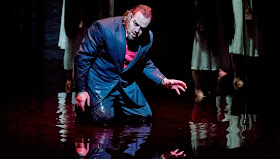Christoph von Dohnányi returns to Philadelphia.
by Paul J. Pelkonen
 |
| Christoph von Dohnányi Photo by Pala de André © The Ravenna Festival. |
The Hungarian conductor Christoph von Dohnányi is back on Broad Street for a two-week stand leading the Philadelphia Orchestra at the Kimmel Center. The first of these programs (seen on Friday evening) focused on music related to funeral rites and personal grief. Somber classics by Mozart and Beethoven were matched with the
Funeral Music of Witold Lutoslawski, the Polish composer who was a leading post-war exponent of the twelve-tone method.
The
Funeral Music is just fifteen minutes, featuring only the string players. the Philadelphians responded with the rich, velvety sound that remains this orchestra’s trademark, unfolding the complex tone-rows and repeated musical patterns that emerge over four movements. Mr. Dohnányi led a clear, precise performance, proving to listeners that a century after its invention, there is no reason to be afraid of music written with twelve tones.
Orchestra and conductor were joined by pianist Rudolf Buchbinder for Mozart’s
Piano Concerto No. 20 in d minor. This is Mozart’s most experimental concerto, with a melancholy opening that is answered almost philosophically from the keyboard. Mr. Buchbinder played the complex emotional development of the first movement (itself influential on the composition style of Beethoven) with intelligence and grace, maintaining a close rapport with the conductor
The pianist skated smoothly through the central slow movement, trickling out melodic lines with a limpid touch that was answered with perfect clarity from conductor and orchestra. These artists were in close accord in the fast finale, racing through the repeats of the
rondo in a performance that lifted this work out of the emotional doldrums. Just before launching the first phrases of the quickstep coda, Mr. Dohnányi locked eyes with Mr. Buchbinder. They then played the last phrases with a glee that evoked two much younger men out to perpetrate mischief in their music.
The
Eroica Symphony is a Philadelphia Orchestra staple, making regular appearances on programs at the Kimmel Center and elsewhere. In this performance, Mr. Von Dohnányi ’s leadership was light-footed but never light-weight. The big dramatic moments in the score were present but not overplayed, and there was exquisite attention to detail in the lesser known sections that allowed listeners to hear this familiar work Ina new and exciting way.
Of particular note: the second movement, a slow
Marcia funebre that saw the composer break new symphonic ground in using this military musical form to portray fallen heroism in sound. Most heroic of all: the mammoth central fugue with horns an cellos seeming to weep openly before coalescing with trumpets and violas in a descending figure that Richard Wagner later borrowed for the Grail march in
Parsifal.
Though this theme appears only briefly in the central section of the March, it returns, radically transformed in the following Scherzo. In fact it's the bedrock rhythm of this mad dance, which is interrupted only by exuberant, interjecting horns. The famous finale with its "Prometheus" theme was played with an attention that made the glowing counterpoint sound almost like Bach. Mr. von Dohnányi and the players were enthusiastic as the final notes were reached, putting shoulder to the wheel and driving the big final moment to an uplifting conclusion.



































